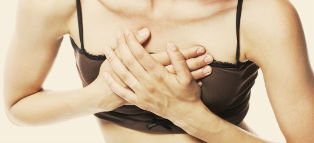If the sore Breasts and gives back, the more likely it is that they have problems with the internal organs located in the chest or in the spine. If you have with this area had already had injuries, for example, rib fractures, chest injury, spinal injury, then from time to time arise the pain can be the consequence.
It also happens that the pain bothers the person for a long time, and the pain killers provide only temporary relief, in this case, most likely, we are talking about a chronic or progressive condition that requires immediate treatment. We will look at some of the disease, the symptoms of which is pain in the chest that radiates to the back.
If the sore Breasts and gives the back: possible causes

Organs of the thoracic cage is located close enough to the other, and the pain that occur in one organ can spread to the other, to give to different parts of the body such as the waist, arm, neck, belly. Sometimes, pain in the chest occurs on the back, this occurs in the following diseases:
1 reason - Problems with the skeleton
Problems with the skeleton, that is to say, the curvature of the spine, such as scoliosis, lordosis and kyphosis. All of them are in the later stages are accompanied not only visible defects, such as asymmetry in the waist area, shoulder blades and shoulders, scoliosis, and pain. Usually the pain occurs in the chest, radiating to the back, sometimes one hand or the neck, while the man tries to make himself more comfortable position, normally deforming the spine. When the curvature of the spine for a long time it is not right that a person loses the ability to be in the proper position with straight back, symmetrical to the shoulder without sagging in the lumbar and thoracic spine, and with each year the situation is only getting worse. Also, chest pain that radiates to your back can be caused by inflammation of the costal cartilages, or as they say the disease Tietze's disease. During the transition of cartilage (rib) to the sternum form a seal, a painful swelling. When the pressure on the pain increases, as well as when coughing and laughing. Most often, pain in the chest radiates to the back, especially when it changes the position of the body.
2 cause - Diseases of the digestive system
Diseases of the digestive system may be accompanied by chest pain that radiates to the back. This is especially true for the development of cholecystitis, in the absence of treatment, acute pain occurs in the chest extends to the back and is that surrounds the character, later, nausea and the body temperature rises, accompanied by fever. Spasm of the esophagus, also causes pain in the chest, radiating to the back. Painful sensations are oppressive in nature, and their appearance is associated with the intake of food. In some cancer digestive diseases there is pain in the chest, radiating to the back, it is very important, as soon as possible to diagnose and begin the treatment. Unfortunately, cancer of the digestive system organs, the pain often occurs when the tumor has already reached a large surface area.
3 due to Diseases of the heart and blood vessels
In the angina pectoris (a disease caused by lack of blood supply to the heart muscle), which is characterized by acute chest pain that radiates to the back. And the pain is concentrated on the left side of the body and are accompanied by shortness of breath, lack of air and the feeling of fear. Most often, angina pectoris occurs due to the excessive physical activity in persons not trained, often in the elderly. Also, if the Breasts are sore, gives the back, then it can be a sign of a serious illness, that is to say, a massive pulmonary embolism. In this disease there is an obstruction of the light of the pulmonary arteries, as a consequence, the oxygen deficiency occurs. During the attack, the person can't breathe, he feels a sharp pain in the chest, radiating to the back, and the breathing becomes frequent and superficial.
If chest pain radiates to the back, and bothers you very often, it makes sense to examine yourself, especially if it is accompanied by symptoms such as shortness of breath, fainting, or signs of problems from the gastrointestinal tract.

























